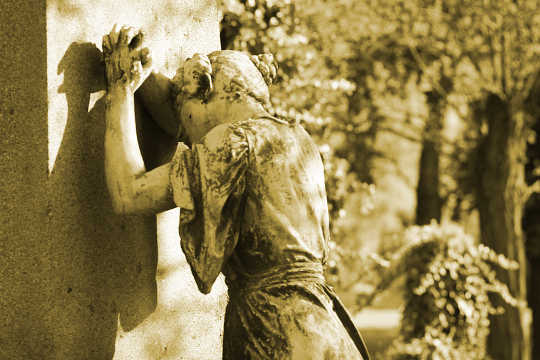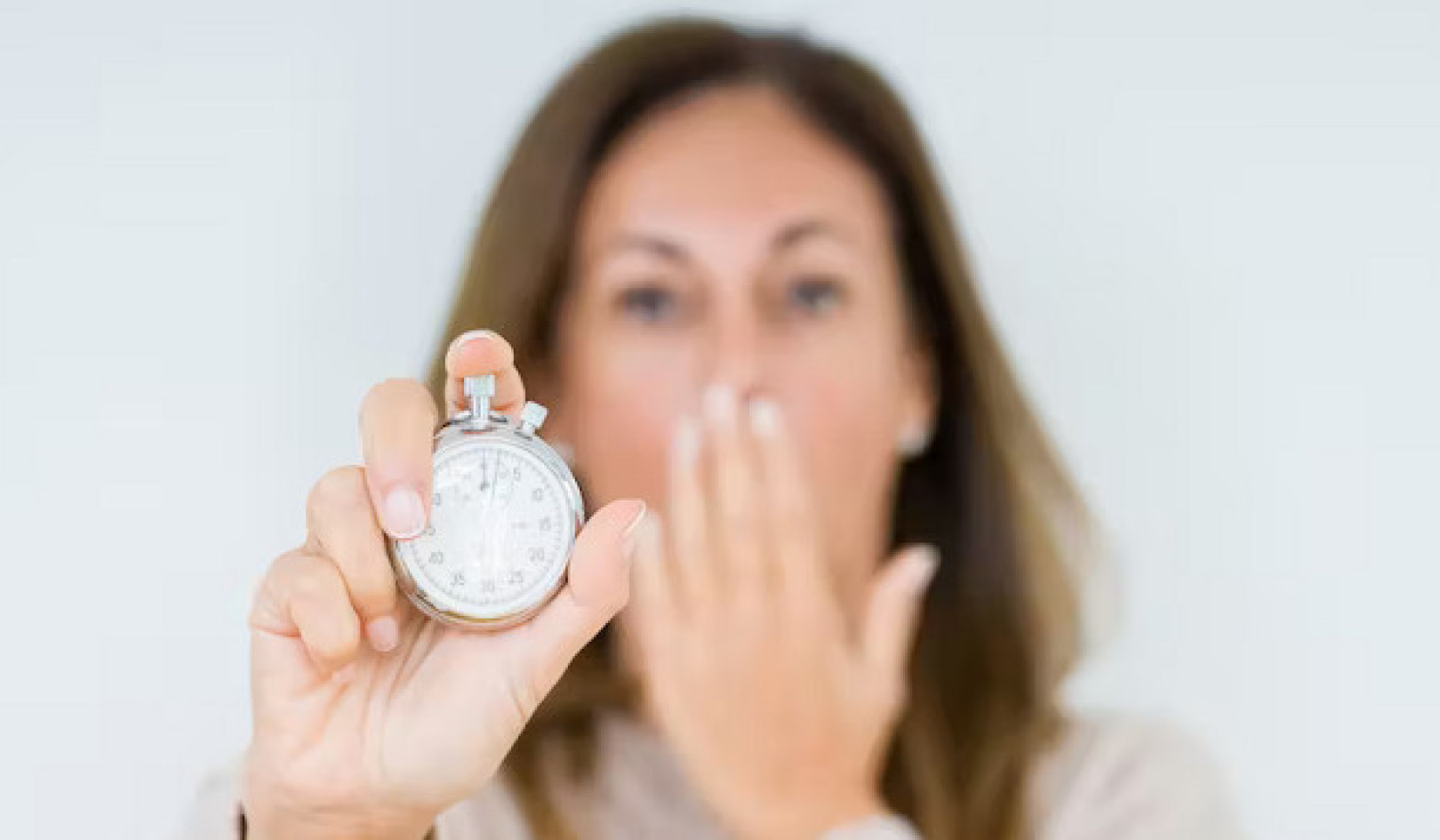
October 18: World Menopause Day. Image by Tern70
In an episode of the comedy Absolutely Fabulous entitled “menopause”, Patsy starts to experience hot flushes and night sweats. Forced into a menopause support meeting, she is regaled with tales of memory loss, sweating, sexual decline and incontinence from other women.
One suffering attendee cries that “the sands of time are trickling through my hourglass!” as she laments her changing body. In the background sit Patsy and Edina – visibly disgusted and horrified at the future that lies ahead of them.
Mentions of menopause in popular culture have traditionally been few and far between. Unfortunately, the few depictions that did exist were much like Ab Fab’s. These were depictions that instilled fear and created little understanding of what experiencing it was really like.
However, over the past two decades, “the change” has become a hot topic for a new generation of writers and creatives. And, this October 18, on World Menopause Day, we can celebrate growing visibility, as new representations offer a more nuanced and empowered view of that period in a woman’s life.
Changing the ‘change’
The idea of the “menopause” has only been around since 1821. It was named by the French physician Charles Pierre Louis De Gardanne in the first article on the subject: De la ménépausie, ou de l’âge critique des femmes (Menopause: The Critical Age of Women).
The male naming of an inherently female experience was, well, problematic. But the term stuck and today is used interchangeably with “the change” as a short-hand for identifying a diverse range of experiences associated with the female ageing process.
{vembed Y=bEAKqgEw8xg}
Medicine has spent centuries focusing on the health risks associated with menopause, including increased risks of depression, heart disease, osteoporosis, cognitive impairment and even dementia. Presenting menopause as a problem to be solved or an issue to be eradicated, historical medical narratives have at best sought to make menopause invisible. At worst, it presented it as a female problem that could be solved by male medical intervention.
But as female life expectancy increased steadily across the ages, debates about the visibility of cultural representations of the menopause began to develop.
Menopause expert Laura Eldridge, suggests:
How your culture sees you, treats you, and talks about you dictates how you live in that culture. Culture is our mirror, and if we see withered crones in the glass, we feel useless and disposable. If, however, we see energy and renewal: well, what does that feel like?
By 2018, American actress Gwyneth Paltrow famously claimed that the menopause" needed rebranding“ for a new generation of women.
Meno-makeover
These changes have inspired a rise in the number of representations of menopause in popular culture. In a major change from the monstrous or comedic woman suffering from hot flashes who is desexualised and sidelined, a swath of new productions have sought to make menopause visible, reframing the change as a period of empowerment.
One particularly powerful depiction is in the award-winning TV series Fleabag. A frank discussion between the titular character and an older businesswoman about ageing takes a turn from the expected as it actively challenges commonly held perceptions of "the change”.
The menopause comes. The fucking menopause comes and it is the most… wonderful fucking thing in the entire world.
Instead of falsely glamorising the menopause the older woman is candid and balanced, offering hope instead of fear and despair. She describes how her pelvic floor crumbled, how she got hot, and no one seemed to care but how there was also freedom to be had. Fleabag admits that she thought it was horrendous, to which the older woman responds: “It is horrendous, and then it is magnificent”.
{vembed Y=RZrnHnASRV8}
Fleabag is not alone. From Menopause the Musical (2001) and its sequel Cruising Through Menopause (2020) and House of Cards(2013-18) to Nine Perfect Strangers (2021) and across the Sex and the City franchise (1998-2004), new candid depictions of menopause and the various experiences of it have been made visible. As a result of such instances becoming more common, the menopause has become a valid subject of cultural discussion and artistic endeavour.
New cultural depictions of menopause matter because they can increase awareness and change perspectives. In doing so, they provide contemporary audiences with a much-needed education that has the potential to enhance public awareness and, in turn, increasing understanding of life cycle change, health and well-being, and the ageing process for both genders.
Research also shows that cultural representations of menopause can influence how women perceive the menopause experience or report symptoms and conceptualise the change as a start or an ending.
Popular culture is a powerful tool for tackling old myths about menopause and offers a vital creative platform for sharing a diversity of experiences of menopause. Presenting new representations of women not only surviving but thriving in the third stage of their lives, culture provides a platform and a toolkit for communicating alternative experiences of the menopause today.![]()
About the Author
Katy Shaw, Professor of Contemporary Writings, Northumbria University, Newcastle
This article is republished from The Conversation under a Creative Commons license. Read the original article.

Books Improving Attitude and Behavior from Amazon's Best Sellers list
"Atomic Habits: An Easy & Proven Way to Build Good Habits & Break Bad Ones"
by James Clear
In this book, James Clear presents a comprehensive guide to building good habits and breaking bad ones. The book includes practical advice and strategies for creating lasting behavior change, based on the latest research in psychology and neuroscience.
Click for more info or to order
"Unf*ck Your Brain: Using Science to Get Over Anxiety, Depression, Anger, Freak-Outs, and Triggers"
by Faith G. Harper, PhD, LPC-S, ACS, ACN
In this book, Dr. Faith Harper offers a guide to understanding and managing common emotional and behavioral issues, including anxiety, depression, and anger. The book includes information on the science behind these issues, as well as practical advice and exercises for coping and healing.
Click for more info or to order
"The Power of Habit: Why We Do What We Do in Life and Business"
by Charles Duhigg
In this book, Charles Duhigg explores the science of habit formation and how habits impact our lives, both personally and professionally. The book includes stories of individuals and organizations who have successfully changed their habits, as well as practical advice for creating lasting behavior change.
Click for more info or to order
"Tiny Habits: The Small Changes That Change Everything"
by BJ Fogg
In this book, BJ Fogg presents a guide to creating lasting behavior change through small, incremental habits. The book includes practical advice and strategies for identifying and implementing tiny habits that can lead to big changes over time.
Click for more info or to order
"The 5 AM Club: Own Your Morning, Elevate Your Life"
by Robin Sharma
In this book, Robin Sharma presents a guide to maximizing your productivity and potential by starting your day early. The book includes practical advice and strategies for creating a morning routine that supports your goals and values, as well as inspiring stories of individuals who have transformed their lives through early rising.






















